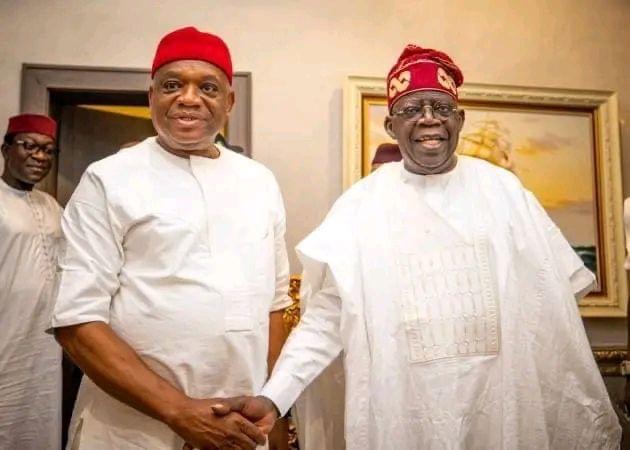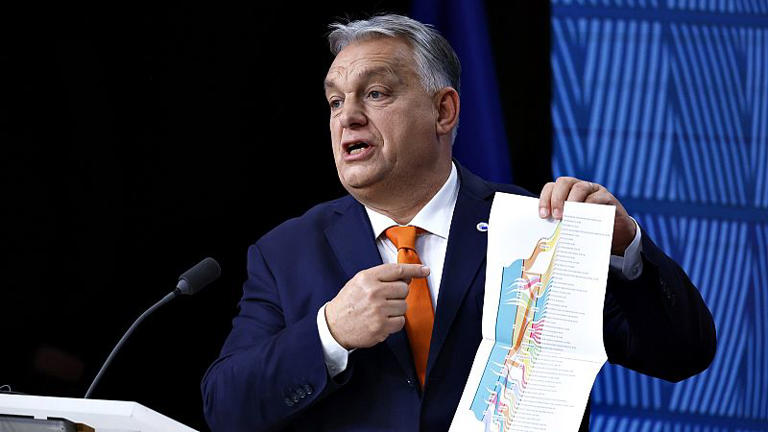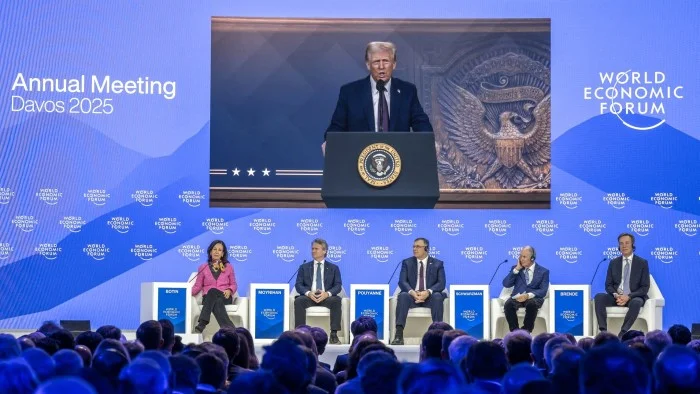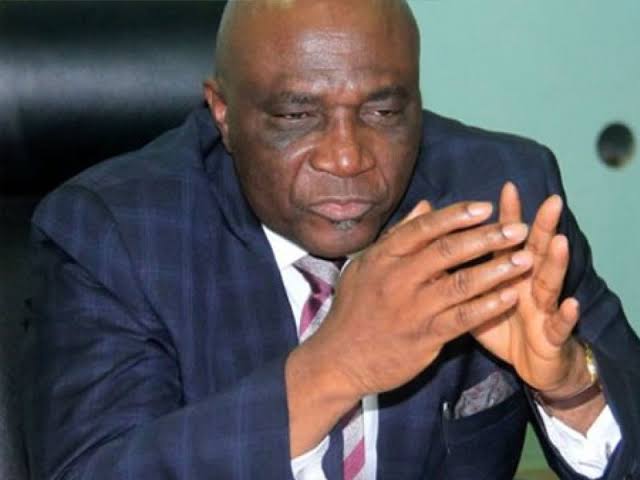Politics
“I am Qualified To Be President” – Orji Kalu Sets Condition to Contest in 2027
Published
3 months agoon
By
Ekwutos Blog
Orji Uzor Kalu, the lawmaker representing Abia North Senatorial District, has revealed his intention to contest for the presidency in 2027 if one crucial condition is met.
The former Abia State governor said he may contest for Presidency if President Bola Tinubu does not seek re-election.
During an interview on Channels Television’s Politics Today, Kalu stated, “Let me tell you, first and foremost, I’m qualified to be a President, and I’m competent. We have already a candidate in our political party unless he is not running. If the party gives me the opportunity to fly their flag, it’s a privilege; it’s not something that I will like. It’s an opportunity given by the party. It’s not about me. My interest in 2027 is to come back, be a lawmaker, sit in the Senate and work in the Senate.”
Kalu attributed Nigeria’s economic struggles to the lack of economic processes and an organized economy.
“We never had an economy since 60 years ago. There is no organized economy here. We have no light, we have nothing, and our stock exchange is just building up. The institutions that drive the economy are very weak, and this is what President Bola Tinubu is trying to rebuild to make sure the institutions are strong. Because if you continue with these handouts and a weak economy, you are not going to go on, somebody must make tough decisions. He might be right or wrong. He’s making tough decisions for the future. The question is the Nigerian people, are they hungry? The answer is yes. But our looks worse because we didn’t make decisions at all,” he lamented.
The Senator suggested that the government should prioritize austerity measures and reduce expenses. “People in government ought to maintain austerity measures. There should be more sewing our coat according to our size, scaling down on most things people in government do.”
The Senator revealed that President Tinubu is aware of the economic situation and often ventures out at night to gauge the pulse of the nation. “The President himself knows that Nigerians are suffering; the President knows that Nigerians are hungry.”
“He is a street person, he knows the street very well. The President sometimes uses his car to go around and know what is happening in Abuja here.”
You may like
Politics
‘Playing with fire’: Orbán’s sanctions veto threat puts Brussels on edge
Published
3 hours agoon
January 24, 2025By
Ekwutos Blog
Diplomats and officials in Brussels are holding their breath as they wait to find out if Viktor Orbán’s increasingly critical rhetoric against EU sanctions will translate into a veto that could upend the bloc’s Russia policy, as soon as next week.
Since February 2022, the bloc has brought in sweeping bans on trade with Russia in energy, technology, finance, luxury goods, transport and broadcasting, among others. It’s also frozen €210 billion assets held by the Russian central bank within the bloc, which have been used to back a multi-billion-euro loan for Kyiv.
Those could all soon be put into question. The restrictions, designed to cripple Moscow’s ability to finance its full-scale invasion of Ukraine, need to be prolonged every six months by unanimity, and the next deadline is 31 January.
In recent days, Orbán and his deputies have ratcheted up their harsh words against the sanctions regime, arguing the inauguration of US President Donald Trump, who wants to negotiate with Russia’s Vladimir Putin, requires the bloc to rethink its longstanding stance.
“The question of extending the sanctions is now on the agenda, and I pulled the handbrake and asked European leaders to understand that this cannot be continued,” the Hungarian Prime Minister said in a radio interview on Friday morning.
One of his ministers, Gergely Gulyás, has openly questioned the six-monthly renewal. “So far, everyone has seen the extension of sanctions as automatic, but we do not think it is automatic now,” Gulyás said on Thursday.
Those comments have stoked fears that Hungary will use its veto to block the rollover, triggering the collapse of a sanctions regime painstakingly built across 15 packages, and depriving the EU of its most hard-hitting tool against the Kremlin.
“It’s clear that if Budapest were to block, we would have a great issue at hand,” said a senior diplomat, who spoke on condition of anonymity due to the sensitivity of the matter. “Budapest is playing with fire.”
The diplomat described the political situation as “mind-blowing” given the dire battleground conditions faced by Ukrainian forces, and predicted the EU would plunge into “uncharted territory” were sectoral sanctions to collapse overnight.
“The shenanigans we get from Budapest are seemingly endless,” the diplomat said.
A closed-door discussion among ambassadors on Friday only increased the uncertainty, as the Hungarian representative maintained ambiguity over his position, several diplomats said.
Instead, Hungary asked to change the agenda of Monday’s meeting of foreign affairs ministers, to allow the item on sanctions renewal, which is generally approved without any fuss, to be openly debated after a separate discussion on Ukraine support.
The Hungarian envoy also made a number of requests concerning energy policy, and in particular Ukraine’s recent decision to terminate the transit of Russian gas through Hungary, another diplomat said.
The decision, taken by President Volodymyr Zelenskyy to stop Moscow from earning “additional billions on our blood,” has met with a furious reaction from Hungary and Slovakia, two landlocked countries that still purchase Russian fossil fuels. Earlier this month, Slovak Prime Minister Robert Fico threatened to use his veto power in retaliation.
‘Transactional’ diplomacy
In his radio interview, Orbán made a direct link between sanctions renewal and the gas dispute, and asked the European Commission to intervene in his country’s favour.
The Commission has said it has “no interest” in extending the transit of Russian gas.
“What is closed now, has to be reopened again. This is not a matter for Ukraine, it is an issue for Europe, an issue for central Europe,” the prime minister said.
“If the Ukrainians want help, for example sanctioning the Russians, then let’s reopen the gas transit routes and allow the central European countries, including Hungary, to receive the gas we need through Ukraine.”
The connection between the two issues has left diplomats scratching their heads, trying to figure out how severe the latest threat actually is. Orbán has previously used his veto to extract concessions, but never to provoke such a disruptive effect on sanctions.
“The threats are taken seriously. But it’s not the first time,” a diplomat said, decrying Hungary’s “transactional” manner of making demands.
“The EU cannot enter into panic mode every time somebody says something in Budapest,” they added. “We have learned to make a clear distinction between what we hear in Budapest and what happens in Brussels.”
The suspense is likely to last, at least, until foreign affairs ministers meet on Monday and Hungary’s representative, Péter Szijjártó, announces his country’s position. Diplomats speculate that, despite the harsh talk, Szijjártó will back down if he can secure new EU assistance for Hungary’s energy needs.
This will pave the way for the renewal to be approved, if not on Monday, then at least before the end of the month.
“We expect a positive result from that discussion. [Sanctions] are a key part of our strategy,” said a high-ranking EU official. The issue of gas transit has “nothing to do with sanctions on Russia. Sanctions on Russia are because of the aggression.”
Asked if Brussels was already drafting a Plan B, the official said: “We don’t envisage any other possibility than that it will be approved in the coming days.”
One factor certain to influence the discussion are the latest comments made by Donald Trump, who took some observers by surprise with hawkish comments against Russia.
“If we don’t make a deal, and soon, I have no other choice but to put high levels of taxes, tariffs, and sanctions on anything being sold by Russia to the United States, and various other participating countries,” Trump said.
“We can do it the easy way, or the hard way – and the easy way is always better.”
The EU is already preparing a 16th package of sanctions against Russia, with the view to approving them before the third anniversary of the invasion, in late February.
Politics
Donald Trump To Reduce Oil Prices Worldwide
Published
4 hours agoon
January 24, 2025By
Ekwutos Blog
Donald Trump has reportedly urged Opec and Saudi Arabia to lower global oil prices and called for central banks worldwide to reduce interest rates immediately after.
Speaking to business leaders in Davos on Thursday, the former US president criticized oil producers for not acting sooner to reduce crude oil costs.
“I’m going to ask Saudi Arabia and Opec to bring down the cost of oil. You gotta bring it down. Frankly, I’m surprised they didn’t do it before the election,”Trump said.
He suggested that lowering oil prices could help stop Russia’s war in Ukraine, saying,
“Right now, the price is high enough that the war will continue. Bring it down, and you could end that war.”
Trump also encouraged global companies to manufacture their products in the US, warning them of heavy tariffs if they import goods into the American market.
He promoted his economic policies, including large tax cuts and reduced regulations, describing them as a “revolution of common sense.”
This is an ongoing story.
Politics
President Bola Ahmed Tinubu has appointed board chairpersons for 42 federal organisations and a secretary to the board of the Civil Defence, Immigration, and Prisons Services.
Published
8 hours agoon
January 24, 2025By
Ekwutos Blog
STATE HOUSE PRESS RELEASE
APPOINTMENT OF BOARD CHAIRPERSONS AND CEOS
President Bola Ahmed Tinubu has appointed board chairpersons for 42 federal organisations and a secretary to the board of the Civil Defence, Immigration, and Prisons Services.
The President has also appointed a new managing director for the Nigerian Railway Corporation and a director-general for the National Board for Technology Incubation (NBTI).
President Tinubu directs the board chairpersons not to interfere with the management of the organisations, emphasising that their positions are non-executive.
All the appointments take immediate effect.
1. NATIONAL YOUTH SERVICE CORPS, MINISTRY OF YOUTH DEVELOPMENT
– Hon. Hillard Eta Chairman (Cross River)
2. NIGERIAN INSTITUTE OF INTERNATIONAL AFFAIRS
– Prof. Bolaji Akinyemi, Chairman (Lagos)
3. FEDERAL AIRPORT AUTHORITY OF NIGERIA, MINISTRY OF AVIATION
– H. E. Abdullahi U. Ganduje, Chairman (Kano)
4. NATIONAL SUGAR DEVELOPMENT COUNCIL
– Sen. Surajudeen Bashiru Ajibola, Chairman (Osun)
5. NIGERIA BULK ELECTRICITY TRADING COMPANY
– H. E. Sulaiman Argungu, Chairman (Kebbi)
6. NATIONAL AGENCY FOR GREAT GREEN WALL
– Sen. Magnus Abe, Chairman (Rivers)
7. NATIONAL TEACHERS INSTITUTE
– Barr. Festus Fuanter, Chairman (Plateau)
8. NATIONAL BOARD FOR TECHNOLOGY INCUBATION (NBTI)
– Raji, Kazeem Kolawole, Director-General (Oyo)
9. NIGERIAN INSTITUTE OF EDUCATIONAL PLANNING AND ADMINISTRATION
– Chief Victor Tombari Giadom, Chairman (Rivers)
10. TEACHERS REGISTRATION COUNCIL OF NIGERIA
– Comrade Mustapha Salihu, Chairman (Adamawa)
11. INDUSTRIAL TRAINING FUND
– Hon. Hamma Adama Ali Kumo, Chairman (Gombe)
12. NIGERIAN INSTITUTE OF SCIENCE LABORATORY TECHNOLOGY
– Donatus Enyinnah Nwankpa, Chairman (Abia)
13. SHEDA SCIENCE AND TECHNOLOGY COMPLEX
– Sen. Abubakar Maikafi, Chairman (Bauchi)
14. FEDERAL MORTGAGE BANK OF NIGERIA
– H. E. Nasiru Gawuna, Chairman (Kano)
15. NATIONAL OFFICE FOR TECHNOLOGY ACQUISITION AND PROMOTION
– Sen. Tokunbo Afikuyomi, Chairman (Lagos)
16. NIGERIAN POSTAL SERVICE
– Chief D. J. Kekemeke, Chairman (Ondo)
17. NATIONAL INLAND WATERWAYS AUTHORITY
– Hon. Musa Sarkin Adar, Chairman (Sokoto)
18. NATIONAL STEEL COUNCIL
– Prof. Abdulkarim Kana Abubakar, Chairman (Nasarawa)
19. NATIONAL ENVIRONMENTAL STANDARDS AND REGULATIONS
ENFORCEMENT AGENCY
– Hon. Garba Datti Muhammad, Chairman (Kaduna)
20. NATIONAL BIO-SAFETY MANAGEMENT AGENCY
– Mu’azu Bawa Rijau, Chairman (Niger)
21. NIGERIAN BUILDING AND ROAD RESEARCH INSTITUTE
– Hon. Durosimi Meseko, Chairman (Kogi)
22. FEDERAL TEACHING HOSPITAL, GOMBE
– Hajia Zainab A. Ibrahim, Chairman (Taraba)
23. NIGERIAN RAILWAY CORPORATION
– Dr.Kayode Isiak Opeifa, Managing Director (Lagos)
24. FEDERAL TEACHING HOSPITAL, IDO-EKITI
– Aare (Hon.) Durotolu Oyebode Bankole, Chairman (Ogun)
25. FEDERAL MEDICAL CENTRE, ABEOKUTA
– Mr Abdullahi Dayo Israel, Chairman (Lagos)
26. FEDERAL MEDICAL CENTRE, ASABA
– Dr. Mrs. Mary Alile Idele, Chairman (Edo)
27. FEDERAL MEDICAL CENTRE, LOKOJA
– Nze Chidi Duru (OON), Chairman (Anambra)
28. FEDERAL MEDICAL CENTRE, OWERRI
– Hon. Emma Eneukwu, Chairman (Enugu)
29. CIVIL DEFENCE, IMMIGRATION AND PRISONS SERVICES BOARD
– Major Gen. Jubril Abdulmalik Rtd, Secretary (Kano)
30. FEDERAL MEDICAL CENTRE, UMUAHIA
– Mr. Uguru Mathew Ofoke, Chairman (Ebonyi)
31. FEDERAL MEDICAL CENTRE, YENAGOA
– Barr. Felix Chukwumenoye Morka, Chairman (Delta)
32. FEDERAL MEDICAL CENTRE, YOLA
– Alh. Bashir Usman Gumel, Chairman (Jigawa)
33. DAVID UMAHI FEDERAL UNIVERSITY TEACHING HOSPITAL, UBUHU, EBONYI STATE
– Dr. Ijeoma Arodiogbu, Chairman (Imo)
34. NATIONAL OIL SPILL DETECTION AND RESPONSE AGENCY
– Chief Edward Omo-Erewa, Chairman (Edo)
35. NIGERIAN MARITIME ADMINISTRATION AND SAFETY AGENCY (NIMASA)
– Yusuf Hamisu Abubakar, Chairman (Kaduna)
36. NNAMDI AZIKIWE UNIVERSITY TEACHING HOSPITAL, NNEWI, ANAMBRA STATE
– Hon. Ali Bukar Dalori, Chairman (Borno)
37. AHMADU BELLO UNIVERSITY TEACHING HOSPITAL, SHIKA, ZARIA,
KADUNA STATE
– Hon. Lawal M. Liman (Chairman)
38. FEDERAL MEDICAL CENTRE KATSINA
– Dr. Abubakar Isa Maiha (Chairman)
39. RAW MATERIALS RESEARCH AND DEVELOPMENT COUNCIL (RMRDC)
– Isa Sadiq Achida, Chairman (Sokoto)
40. FEDERAL MEDICAL CENTRE BIRNIN KUDU
– Dr. Mohammed Gusau Hassan, Chairman Zamfara
41. NATIONAL BUILDING AND ROAD RESEARCH INSTITUTE
– Hon. Yahuza Ado Inuwa, Chairman (Nasarawa)
42. SOKOTO-RIMA RIVER BASIN DEVELOPMENT AUTHORITY
– Amb. Abubakar Shehu Wurno, Chairman (Sokoto)
43. AMINU KANO TEACHING HOSPITAL
– Augustine Chukwu Umahi, Chairman (Ebonyi)
44. FEDERAL SCHOLARSHIP BOARD
– Engr. Babatunde Fakoyede, Chairman (Ekiti)
45. NIGERIAN SOCIAL INSURANCE TRUST FUND
– Hon. Shola Olofin, Chairman (Ekiti)
Bayo Onanuga
Special Adviser to the President
(Information & Strategy)
January 23, 2025

ASSUMPTA FLYOVER: CAN URGES RELIGIOUS AND COPORATE BODIES TO COOPERATE WITH IMO GOVT

Ending Russia’s war in Ukraine this year is possible, says ex-NATO chief Stoltenberg

‘Playing with fire’: Orbán’s sanctions veto threat puts Brussels on edge
Trending
- Politics11 months ago
Nigerian Senate passes Bill seeking the establishment of the South East Development Commission.

 Business11 months ago
Business11 months agoInflation hits record high of 29.90% on naira weakness

 Politics8 months ago
Politics8 months agoBREAKING: Federal Gov’t Offers To Pay Above N60,000, Reaches Agreement With Labour

 SportsNews11 months ago
SportsNews11 months agoOlympic Qualifiers 2024: CAF Confirms Dates For Super Falcons Vs Banyana Banyana

 Trending3 months ago
Trending3 months agoNYA demands release of ‘abducted’ Imo chairman, preaches good governance
- Business3 months ago
US court acquits Air Peace boss, slams Mayfield $4000 fine

 Politics3 months ago
Politics3 months agoMexico’s new president causes concern just weeks before the US elections

 Politics11 months ago
Politics11 months agoGovernor Hope Uzodinma’s New Cabinet In Imo: The Gainers, The Losers

